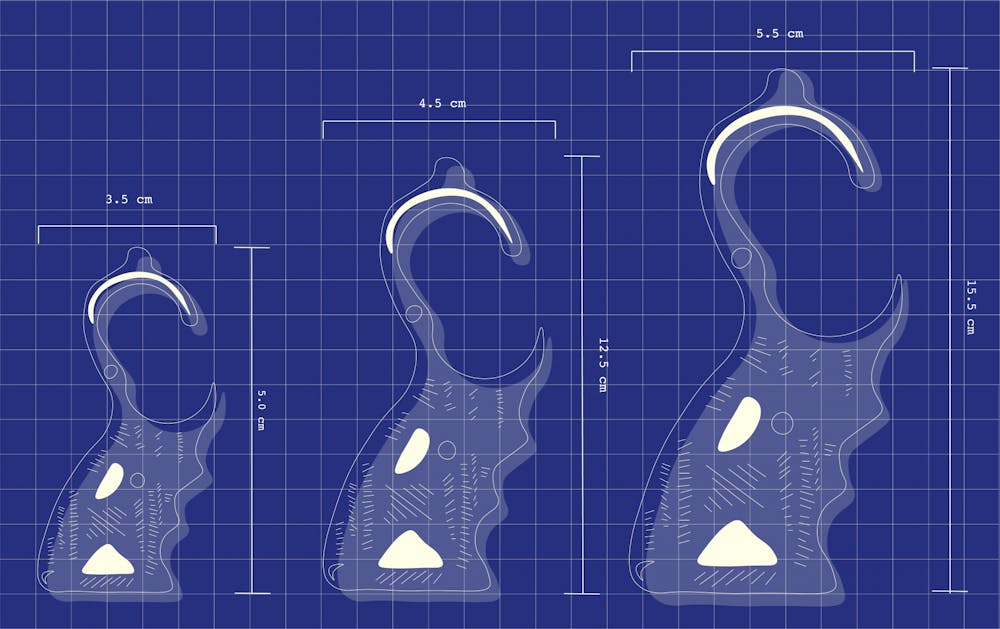A sophomore at the Ira A. Fulton Schools of Engineering has created a contact-prevention multitool to slow the spread of COVID-19.
The Coronavirus Multitool, created by Benjamin Voller-Brown, a sophomore studying mechanical engineering, helps reduce indirect transmission by limiting the amount of public surfaces people touch.
The tool can open doors, push shopping carts, press buttons and act as a stylus for both capacitive and resistive touchscreen devices.
Each tool is 3D printed from the common printing material polylactic acid. The capacitive touchscreen functionality comes from a strip of aluminum wrapped around the edge of each multitool.
Voller-Brown used multiple pieces of software to create the Coronavirus Multitool. He used SolidWorks to craft the first design, Fusion 360 for simulations and shape optimization and Ultimaker Cura to print the product.
He said he had to make around 20 prototypes before landing on a final product.
“For the engineering side, the hardest hurdle was figuring out how to optimize the material used versus the strength,” Voller-Brown said. “So that took probably about 40% of the iterations.”
The inspiration for the tool came from Voller-Brown's experiences with his mother, who has preexisting conditions.
"The reason I created this was because I had been grocery shopping with my mom who's a post-cancer patient, and this was back when COVID infections were only like 100,000 and in a couple of countries," Voller-Brown said. "I noticed her pushing around the shopping cart, and then touching her face and everything like that."
According to the World Health Organization, COVID-19 can be transmitted by touching the eyes, nose or mouth after touching surfaces with infected droplets.
Voller-Brown donates 5% of all sales to the Multiple Myeloma Research Foundation, a nonprofit organization focused on finding a cure for multiple myeloma, a cancer found in plasma cells.
The Coronavirus Multitool can be found in both small and large sizes on Etsy. Voller-Brown said he's also developed an extra-large model specifically for ASU students.
Voller-Brown hopes ASU will purchase and distribute the extra-large multitools to students.
"The main thing that I could see for ASU students, in particular, would be using it on the extremely large door handles that ASU has for some reason," Voller-Brown said.
Voller-Brown submitted the idea to the National Academy of Engineering’s Grand Challenge Scholars Program at ASU. All Fulton undergraduate students can apply to the program.
The goal of the program is to prepare engineering students to address major societal challenges. Voller-Brown found his mentor for the project, Edward Davis, through this organization.
Davis is a polymer materials science professor and the director of the Grand Challenge Scholars Program at Auburn University.
“What I helped him think through was, 'If I’m going to make something for the consumer, maybe one of the things I might want to do is get the consumer to give me some feedback,'" said Davis.
Voller-Brown decided to start his own company, Arceate Health Innovation, to market and sell the multitools.
The hardest part of the business side of his new creation, Voller-Brown said, is finding customers.
Although this is Voller-Brown’s first for-profit company, he gained some of the skills necessary in high school when he and his friend Roshan Sanyal created a nonprofit organization named CubeKidz.
For the nonprofit, Voller-Brown and Sanyal visited local schools and taught students to solve Rubik’s cubes using algorithms. They also held fundraising events to expand the size of the program and received some funding from the Si Se Puede Foundation.
Sanyal said that Voller-Brown's kindhearted nature and drive led him to find solutions like the Coronavirus Multitool.
"In his heart, in his mind, he's like, 'I want to do something that I can actually help people,'" Sanyal said.
Although starting small, Voller-Brown intends to cultivate his new company and continue to expand. He said that he could see himself working in entrepreneurship far into the future.
“Hopefully this is exactly what I’m doing, because this is part of the first little bit of a company that I’ve started, and I want to ultimately end up developing and growing this company long-term,” Voller-Brown said.
Reach the reporter at jageenen@asu.edu and follow @joshgeenen on Twitter.
Like The State Press on Facebook and follow @statepress on Twitter.




